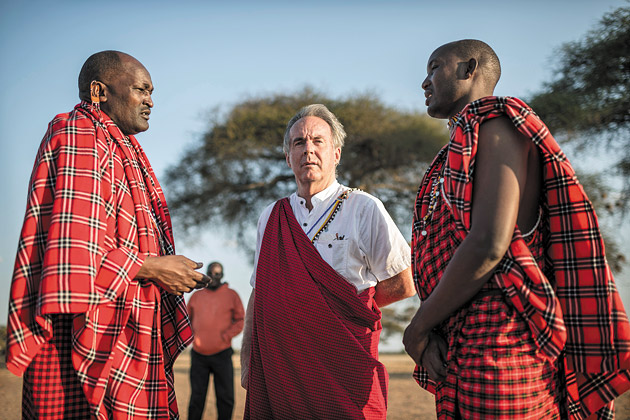Many of the world’s emerging countries are now highly desirable holiday destinations, despite many of them suffering from overwhelming poverty, exemplified by Ethiopia winning Best Tourism Destination for 2015. At our latest BRIC HOUSE think tank session, we asked a dozen of the industry’s leading professionals how this contradiction of luxury and poverty works.

Elisa Grimaldi and Katie O’Lone with the BRIC+ team
Comfortable Transportation + Safety + Unique Experiences = Luxury Travel
First we had to define what luxury means in regards to travel. It was soon clear that it did not simply mean a king-size bed, a margarita by the infinity pool, or even great service. ‘People want to go back to basics. They want risk, immersion into local culture, extreme sports, once in a lifetime experiences, and then the luxury aspect is the safety, the transportations and the warm bed.’ This was the passionate view of Manuel Diaz Cebrian, the former Director of the Mexico Tourism Board who has forty years of experience in the travel industry. Many agreed with him, adding that luxury is also about experiencing something not many others can. The inaccessibility, the risk, and the things you learn from interacting with local people who have a culture different to yours, are the key features of luxury travel.

Hall of diamonds, Golestan Palace. Tehran, Iran.
Forget St Tropez, come to Iran
We asked why emerging markets have become the new luxury destination. Manuel explained that ‘the three drivers of tourism are culture, gastronomy and natural resources’ all of which emerging markets have in plenty. Our chair, Brett Gregory-Peake, Marketing Director at Adoreum, explained that from his experience, ‘people want more than just a sunbed; they want an experience, a pursuit, something to tick off their bucket list.’ With most of the UNESCO World Heritage Sites situated in emerging markets, amazing experiences are not something a traveller to these places will fall short on. Rachel Frye, the director of Etoile Aviation, explains her clients’ enthusiasm that Iran is making VISAs more accessible for next year; ‘Iran has nineteen UNESCO World Heritage Sites that tourists haven’t been able to easily access for years – luxury is being the first to see them again, going to places most people haven’t.’
Time: Slow it down
Time becomes everyone’s most sought after commodity, but it cannot be bought or regained. People go on holiday with the intention of taking some time for themselves and their families, but when taking a holiday in a Western tourist destination time is still ticking – and fast. Manuel argues that in emerging markets it is possible to slow down time because ‘the tempo of life is slower and you quite literally go back in time a few decades; before modern technology, before the digital age, and experience an authentic way of life.’

Image via Bloomberg
Eco-Tourism: Meet the locals
It is this ‘way of life’ many people seek to not just see, but join and leave a mark. HNW travellers want the ‘Gap Year’ experience but with the comfort of a private plane, a big bed, and five-star service. Because of this, luxury hotels are now getting more involved with locals rather than simply being gated resorts. Katie O’Lone from Mason Rose tells the group that ‘one of our hotels offers excursions to be part of the tribe or join a local fisherman for a weekend.’ Her colleague Elisa Grimaldi adds that ‘Eco-lux lodges in volcanoes in Uganda are a destination of great interest for our luxury travellers.’ For these reasons, being underdeveloped is actually an asset rather than a shortcoming, and the premium outweighs the risk for travellers. Therefore, as Manuel argues, it is important to ‘protect the personality of every country. Uniqueness should be protected and promoted.’

Pictured: Manuel Diaz Cebrian, former Director of the Mexico Tourism Board
Who wants to come whale watching in Cabo?
The question is: how do you access this audience of HNW travellers looking for adventure in unexplored territory? Word of mouth was arguably the best strategy, but what if you are a new boutique hotel or offering a new trip to a new place or a new experience in an already known place (such as whale-watching in Cabo, or the chance to see the most exotic birds in the world in Nigeria)? Our founder, Lydia Vladimirskaya, suggested ‘working from the top with the opinion makers is the most important way to promote a place or experience.’ Having people of influence say it is safe, above all, and a great experience is the answer. At BRIC Plus Magazine we are trusted by our HNW readers and showcase places and experiences in our editorial that we believe are extraordinary. ‘There is still a certain distrust of the digital from my experience with HNW travellers; they want your opinion or the opinion of trusted editorials’ says Tony Walker-Banfield from Travel Counsellors. He adds that ‘BRICPlusNews is a great place to show my clients current facts about what is going on in certain emerging markets. They write about interesting cultural things happening in unusual tourist destinations.’
Don’t try to Westernise rawness
Natural experiences and local culture sell. People are looking for something different, which is why the travel industry should not rush to ‘Westernise’ emerging destinations. Rather than using the same model of a resort in Europe or America, hoteliers and travel agencies should focus on the local selling points. They should build an experience around them, one that both promotes and protects it, because uniqueness is luxury.
Hosted at SKC, Images and video by Alex Xi Zhang and gifts from Dalit Goods.


